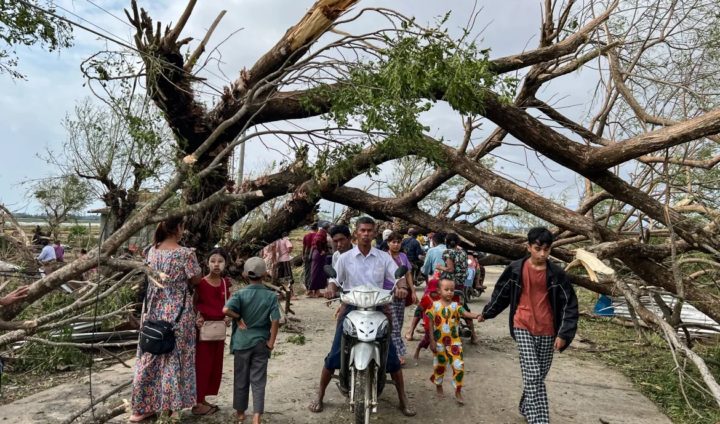On Sunday, Cyclone Mocha swept through southeastern Bangladesh and Myanmar, causing a storm surge in western Myanmar where communication systems were largely cut off. The cyclone hit land between Cox’s Bazar in Bangladesh and Myanmar’s Sittwe, with winds reaching up to 195 kmph (120 mph), making it the strongest storm to hit the Bay of Bengal in over a decade. The cyclone had largely passed by late Sunday, and India’s weather office stated that it would weaken as it approached the rugged hills of Myanmar’s interior.
The sprawling refugee camps in Cox’s Bazar were spared, but around 400-500 makeshift shelters were damaged. These camps housed almost one million Rohingya refugees, but fortunately, there were no immediate reports of casualties. Disaster relief officials reported that the cyclone caused “no major damage” in Bangladesh, and the authorities had evacuated 750,000 people before the cyclone.
Following the cyclone, communication with the port town of Sittwe was largely cut off, and streets in the town turned into rivers as the storm surged ashore, tearing roofs from buildings and downing power lines. At one camp for displaced Rohingya in Kyaukphyu, homes made of tarpaulin and bamboo were ripped apart by the wind.
Residents at this camp were watching anxiously as the sea tide rose. The camp leader, Khin Shwe, stated that “We are now going to check whether sea water is increasing to our place… if the seawater rises, our camp can be flooded.”
In Kyauktaw town, located nearly two hours inland, residents emerged after the storm into debris-littered streets and started to patch up the damage to their properties. One resident, Phyu Ma, stated that “A power pylon had crashed into one house and several buildings had lost their corrugated iron roofs. I am very scared as I never had such an experience. I have never seen such a strong wind… I didn’t think this would happen. I thought only Sittwe will be hit.”
Ahead of the storm, thousands left Sittwe, packing into trucks, cars, and tuk-tuks and heading for higher ground inland. Meteorologists had warned of a storm surge of up to 3.5 meters (11 feet). Maung Win, a 57-year-old who spent the night in a shelter in Kyauktaw, stated that “We are not OK because we didn’t bring food and other things to cook. We can only wait to get food from people’s donations.”







